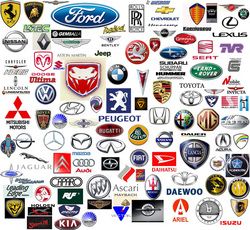|
By accessing or using The Crittenden Automotive Library™/CarsAndRacingStuff.com, you signify your agreement with the Terms of Use on our Legal Information page. Our Privacy Policy is also available there. |

What’s In A Name?
|
|---|
|
|
What’s In A Name?
Geoff Maxted
DriveWrite
October 1, 2013
It has just been reported that there are some 800,000 names already trademarked in the car world. If manufacturers thought it was hard to come up with a catchy new car name a generation ago, their task is looking even more onerous now. It shows how these things snowball. Only twenty five years, or so, ago, there were just 75,000 names registered.
As automotive marketing becomes increasingly global, there are simply fewer words to call a car that are legally available around the world and that work in multiple cultures. That’s the important thing. What is a perfectly anonymous name in the UK may well mean something offensive in another culture. Race, creed, religion and the colour of skin must all be taken into account.
This is why the industry is going with a new vehicle-naming strategy: Keep the old names for as long as possible. Use common names around the world instead of looking for multiple names. Use numbers instead of words. And if necessary, resurrect an old one.
For example, In the USA last year Chrysler introduced a mid-sized saloon called the Dodge Dart, a name they used in the Swinging Sixties. Nissan has just begun reintroducing its retired brand name ‘Datsun’ in some markets, including Indonesia and India. It is apparently getting harder to find names that mean anything. You know what an Jaguar is, for example. It's an animal. It's powerful. It's a good name for a car. Elephant isn’t.
The Internet is a big factor now too. Customers all over the world are simultaneously looking for product information online these days. A customer in China or Poland who types their particular equivalent of "affordable hatchback car" into a search engine doesn't need to be confused by online marketing that refers to a car called one thing in China and something else in Europe.
Part of the new naming problem requires automakers to stay on top of an ever-changing public mood. For European markets lately, companies are steering away from words that sound East European or Russian, even though they are targeting Russia and East Europe as potential growth markets. It seems that people don't have a good response to names that sound East European for some reason.
One commentator said that the shrinking pool of available words will cause the industry to end up with "names that sound like pharmaceuticals" around the world. They’ll make them up even more than they do now. Ultimately, as models change, they might just as well keep the names they’ve already got. They might not always have had the best reputation in the past but as long as it’s clear that the product is new why fix what’s not broken?



















